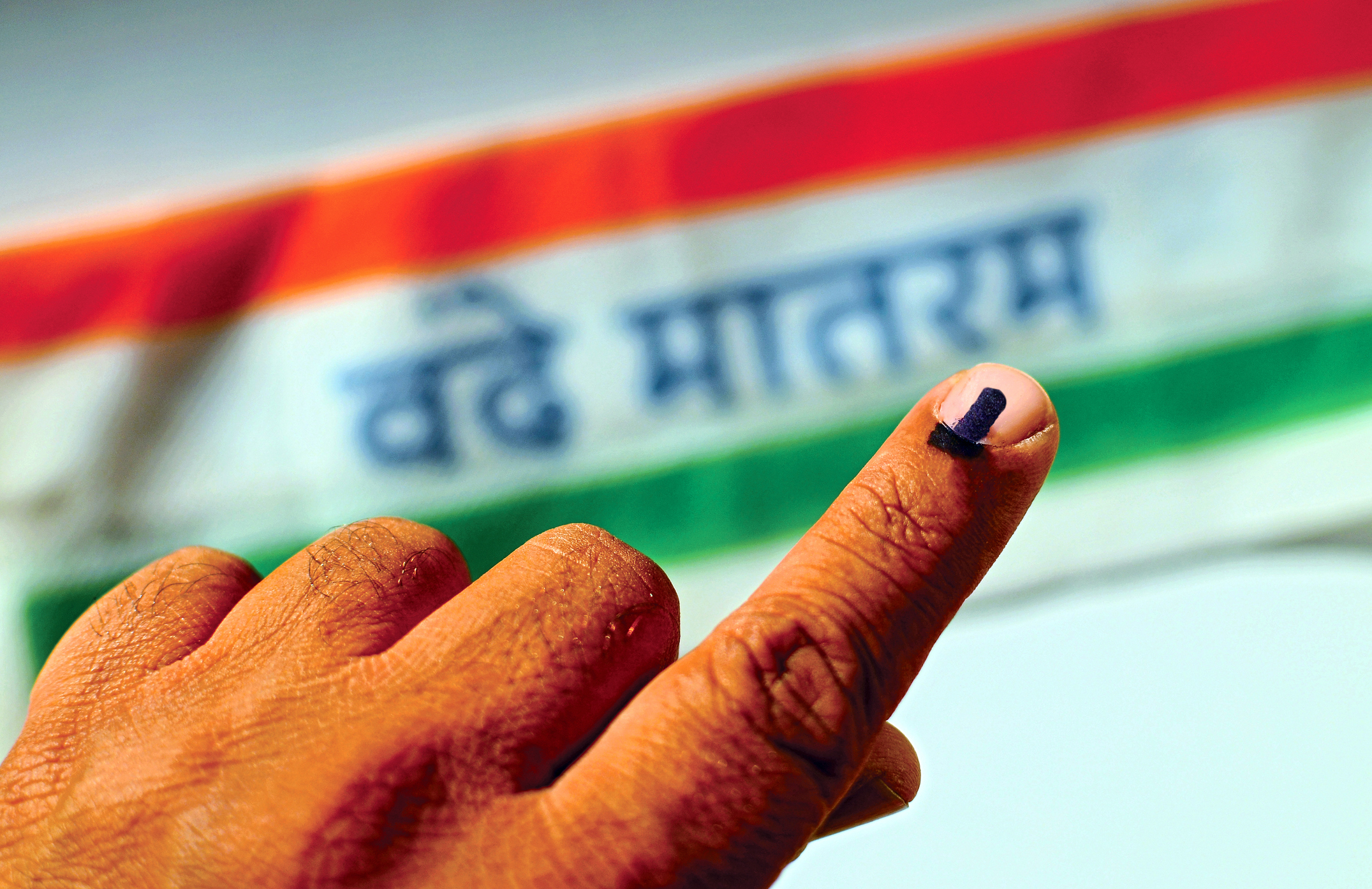Phase 6 of the Lok Sabha election will see contests on 58 seats spread across six states and two union territories including the Anantnag-Rajouri parliamentary constituency (PC) in Jammu & Kashmir (J&K), which was scheduled for Phase 3 but was shifted to Phase 6 due to adverse weather conditions.
Haryana will witness elections in all 10 Lok Sabha constituencies in this phase. In the last Lok Sabha election in 2019, the Bharatiya Janata Party (BJP) won all ten seats in the state with a 58.21% vote share. The Congress came second with a 28.4% vote share. The Indian National Lok Dal (INLD) got just 1.9% votes, while the Jannayak Janta Party (JJP), an INLD’s breakaway faction, got 4.9% votes. The BJP was also the largest party in the 2014 Lok Sabha election. Then, the party had won seven seats with a 34.84% vote share. Congress won a single seat with 22.99% vote share, while the INLD got two seats with 24.43% votes. When we compared the results of both elections, we found that the INLD votes shifted mainly in the BJP’s favour in 2019.
While the previous two Lok Sabha elections have been in BJP’s favour, the rival parties, which include an Aam Aadmi Party (AAP) and Congress alliance, would be banking on the result of the last assembly election that saw BJP’s vote share going down from the previous Lok Sabha election. Haryana has 90 assembly constituencies. The BJP won 40 of these with 36.49% votes. The Congress party was second, winning 31 seats with a 28.08% vote share. The JJP got ten seats with a 14.84% vote share, while the INLD got one seat with a 2.44% vote share.
Jat and OBC voters form a significant chunk of the state’s voters. While the BJP’s social engineering theme spreads across all caste groups, other parties in the state have Jats as their core voters. The Congress, the INLD, and the JJP are all led by the Jat leadership in the state.
Core constituencies going to the poll include Karnal, with former Haryana CM Manohar Lal Khattar from BJP and Divyanshu Budhiraja from Congress as candidates. From Kurukshetra, the BJP has fielded Naveen Jindal against AAP’s Sushil Gupta and INLD’s Abhay Singh Chautala. Rao Inderjit Singh from the BJP is fighting against the Congress’s Raj Babbar in Gurgaon, while Deependra Singh Hooda from the Congress and BJP’s Arvind Kumar Sharma are rival in Rohtak.
In the National Capital Territory of Delhi, the BJP won all seven parliamentary constituency seats in the 2014 and 2019 Lok Sabha elections, while the AAP has been ruling the UT since 2013, with President’s Rule in between.
In the 2020 assembly election in Delhi, the BJP won 8 seats but got 38.51% vote share. On the other hand, the AAP won 62 out of 70 seats in the NCT of Delhi with a 53.57% vote share. Congress was in third place with 4.26% votes. Five years back, the 2015 state assembly election saw a similar result. The BJP got three seats with a 32.19% vote share. The AAP won 67 seats with 54.34% vote share, while the Congress was third with 9.65% vote share.
The results of the Lok Sabha elections are totally opposite. In the 2019 Lok Sabha election in Delhi, the BJP won all seven Lok Sabha seats with a 56.85% vote share. The Congress got 22.63% votes, while the AAP got 18.2% votes. The 2014 Lok Sabha election also saw all seven seats go to the BJP with a 46.63% vote share. The Congress got 15.22% votes, while the AAP got 33.08% votes.
If we go by the 2019 Lok Sabha election result in Delhi, the BJP’s vote share was 16% more than the combined votes of the AAP and the Congress. The AAP and the Congress are fighting these Lok Sabha polls together as an alliance in Delhi. The BJP improved its vote share significantly from the 2014 Lok Sabha election in the UT. While the AAP and Congress alliance would like to bank on the last assembly election results, the previous Lok Sabha elections are in BJP’s favour.
Key candidates and fights in Delhi include the New Delhi PC, where the BJP has fielded Bansuri Swaraj, daughter of former Minister of External Affairs, Late Sushma Swaraj, against senior AAP leader Somnath Bharti. BJP’s Manoj Tiwari from North East Delhi PC is fighting against the Congress’ Kanhaiya Kumar, while from Chandni Chowk, Praveen Khandelwal from the BJP and Jai Prakash Agarwal from the Congress are in the electoral fray.
West Bengal’s eight parliamentary constituencies—Tamluk, Kanthi, Ghatal, Jhargram, Medinipur, Purulia, Bankura, and Bishnupur—will go to polls on Saturday. Out of the eight, the BJP won five last time, and AITC won three. Purba Medinipur, with two Lok Sabha seats, Tamluk and Kanthi is the stronghold of the Adhikari family. The family is led by patriarch Sisir Adhikari and his sons Suvendu, Dibyendu, and Soumendu, who hold significant political influence in the region. They were AITC members and winners in 2019 but are now in the BJP.
From Tamluk, the BJP has fielded Abhijit Gangopadhyay, who recently resigned from his judicial position in Kolkata High Court. He is pitted against Debangshu Bhattacharya of the AITC youth wing. From Kanthi, BJP’s Soumendu Adhikari will face AITC’s Uttam Barik. Ghatal seat will see two actors fighting against each other, sitting MP and Bengali cine star Deepak Adhikari (Dev) and BJP’s Hiranmoy Chattopadhyaya. Agnimitra Paul, a fashion designer turned politician, is BJP’s candidate from Medinipur PC. The AITC has fielded actress June Maliah from there.
Fourteen parliamentary constituencies in Uttar Pradesh will also witness an election tomorrow. The BJP won nine seats, the Bahujan Samaj Party (BSP) four, and the Samajwadi Party (SP) one in 2019. Of these fourteen PCs, the BJP had won Ambedkarnagar, Shravasti, Lalganj, and Jaunpur in 2014, but rival parties emerged as winners in 2019. Azamgarh’s seat was won by SP’s Akhilesh Yadav in 2019 and Mulayam Singh Yadav in 2014, but it went to a BJP winner in the 2022 by-election.
For the 2024 election, from Sultanpur, the BJP has fielded sitting MP Maneka Gandhi against the SP’s Rambhual Nishad and the BSP’s Udraj Verma. From Allahabad, the BJP’s Neeraj Tripathi is fighting against Ujjwal Rewati Raman Singh of the Congress and Ramesh Kumar Patel of BSP. Akhilesh Yadav’s cousin Dharmendra Yadav is fighting against sitting MP and BJP’s Dinesh Lal Yadav ‘Nirahua’ and BSP’s Sabeeha Ansari in Azamgarh. Phulpur, from where India’s first Prime Minister, Jawaharlal Nehru, began his electoral journey, has been a BJP stronghold since 2014. The party has fielded Praveen Patel against SP’s Amarnath Maurya and BSP’s Jagannath Pal.
Bihar’s Phase 6 constituencies include Valmiki Nagar, Paschim Champaran, Purvi Champaran, Sheohar, Vaishali, Gopalganj, Siwan, and Maharajganj. In 2019, the NDA parties won all eight PCs. The BJP won four seats, the Janata Dal (United) or JD(U) won three seats, and the Lok Janshakti Party (LJP) won one seat.
JD(U) ‘s Lovely Anand, wife of former MP Anand Mohan, is contesting against Rashtriya Janata Dal (RJD) ‘s Ritu Jaiswal from Sheohar PC. Except for Siwan, all other seats are expected to see a direct fight between BJP and RJD-led alliances in the state. In Siwan’s triangular contest, JDU’s Vijaylakshmi Devi and RJD’s Awadh Bihar Choudhary will face former MP Shabuddin’s wife, Hena Shahab, who is contesting as an independent candidate.
The missing keys of the Ratna Bhandar of the Jagannath temple have emerged as a critical election issue in Odisha, where six PCs will go to the polls. Sambalpur will witness an electoral confrontation between Biju Janata Dal (BJD) ‘s Pranab Prakash Das and BJP’s Dharmendra Pradhan, who is being seen as the BJP’s CM face for the upcoming assembly elections. Pradhan is contesting the Lok Sabha election for the first time since 2009. BJP’s Nitesh Ganga Deb won this seat in 2019.
From Puri, BJP spokesperson Sambit Patra is fighting against BJD’s Arup Patnaik and Congress’s Jay Narayan Patnaik. In 2019, Patra lost this seat by a close margin of just 1% votes to BJD’s Pinaki Misra. Odisha’s capital, Bhubaneshwar, will see an electoral battle between the BJP’s Aparajita Sarangi, the BJD’s Manmath Routray, and the Congress’s Yasir Nawaz.
From Anantnag-Rajouri PC in J&K, Jammu, and Kashmir People’s Democratic Party’s Mehbooba Mufti is fighting against National Conference’s Mian Altaf Ahmad and Apni Party’s Zafar Iqbal Khan Manhas. Anantnag, pre-delimitation, used to be a PDP stronghold. Post-delimitation, it has significant Jammu areas, and it is expected to be a tough battle for Mehbooba to maintain her hold here. Jharkhand will also see elections on four PCs: Ranchi, Jamshedpur, Dhanbad, and Giridih.




















